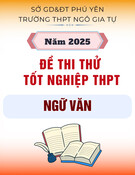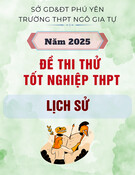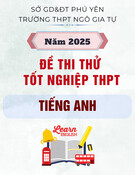
S GD&ĐT VINHƠ
PHUC
TR NG THPT LIÊN ƯƠ
S NƠ
(Đ thi g m: 0ề ồ 5 trang)
Đ KTCL ÔN THI THPT QU C GIA NĂM 2017-Ề Ố
2018
Môn: TI NG ANH – ĐÊ S 9Ế Ố 3
Th i gian làm bài: 60 phút, không k th i gian phát đờ ể ờ ề
Ho va tên thi sinh: ……………………………………………………………………. SBD:
…………………………
Mark the letter A, B, C, or D on your answer sheet to indicate the word whose underlined part differs
from the other three in pronunication in each of the following questions.
Question 1: A. nowadays B. dykes C. ruins D. pesticides
Question 2: A. opposite B. economic C. appropriate D. technology
Mark the letter A, B, C, or D on your answer sheet to indicate the word that differs from the other
three in the position of the primary stress in each of the following questions.
Question 3: A. government B. interview C. reference D. understand
Question 4: A. equipment B. scholarship C. develop D. discourage
Mark the letter A, B, C, or D on your answer sheet to indicate the word(s) CLOSEST in meaning to
the bold, italic word(s) in each of the following questions.
Question 5: A magician is an entertainer who performs a series of deceptive tricks based on the
principles of physics, optics, and psychology.
A. skillful B. incomprehensible C. misleading D. obvious
Question 6: The adhesive qualities of this new substance far surpass those of all others of its type.
A. disintegrating B. dissolving C. damaging D. sticky
Mark the letter A, B, C, or D on your answer sheet to indicate the word(s) OPPOSITE in meaning to
the bold, italic word(s) in each of the following questions.
Question 7: An employer must be very careful in dealing with subordinates and documenting their files
in order to avoid complaints.
A. bosses B. coordinators C. outside help D. employees
Question 8: It’s incomprehensible to a nonaddict that an illicit drug can control the life of a young
abuser.
A. readable B. favorable C. imperative D. understandable
Mark the letter A, B, C, or D on your answer sheet to indicate the underlined part that needs
correction in each of the following questions.
Question 9: A smile can be observed, described, and reliably identify; it can also be elicited and
manipulated under experimental conditions.
A. identify B. experimental C. can also D. A smile
Question 10: A food additive is any chemical that food manufactures intentional add to their products.
A. products B. intentional C. any chemical D. additive
Question 11: A number of the American Indian languages spoken at the time of the European arrival in
the New World in the late fifteen century have become extinct.
A. spoken B. fifteen C. at the time D. A number of
© Đ Bình – THPT Li n S n, L p Th ch, Vĩnh Phúc – ỗ ễ ơ ậ ạ www.violet.vn/quocbinh72 Trang 1/5

Mark the letter A, B, C, or D on your answer sheet to indicate the correct answer to each of the
following questions.
Question 12: Andrea has a________ rug on the floor in her bedroom.
A. sheepskin lovely long white B. long lovely white sheepskin
C. lovely long sheepskin white D. lovely long white sheepskin
Question 13: I haven’t________ decided where to go on holiday.
A. already B. yet C. still D. just
Question 14: Computers that once took up entire rooms are now________ to put on desktops and into
wristwatches.
A. small enough B. smaller than C. so small D. as small as
Question 15: The average________ watches television for about 15 hours a week.
A. spectator B. observer C. audience D. viewer
Question 16: Although Brenda came last, everyone agreed she had________ her best.
A. had B. got C. done D. made
Question 17: We didn’t________ to the station in time to catch the train.
A. reach B. get C. make D. arrive
Question 18: Bill took not only a French class________ a Japanese class.
A. but too B. too C. but also D. and
Question 19: Sharon did not attend the meeting because she was________ the weather.
A. under B. in C. due to D. on
Question 20: One prefers to shop at Harrods, ________?
A. isn’t it B. doesn’t one C. don’t you D. isn’t one
Question 21: How many________ the game is still unknown.
A. fans attended B. fans attending C. did fans attend D. has attended
Question 22: The second bus, ________ didn’t stop either.
A. that was full B. what was full C. which was full, D. that was fully,
Question 23: ________ here for hours and I feel tired.
A. I have stood B. I’m standing C. I have been standing D. I had been standing
Read the following passage and mark the letter A, B, C, or D on your answer sheet to indicate the
correct answer to each of the questions from 24 to 30.
Under certain circumstances, the human body must cope with gases at greater-than-normal
atmospheric pressure. For example, gas pressures increase rapidly during a dive made with scuba gear
because the breathing equipment allows divers to stay underwater longer and dive deeper. The pressure
exerted on the human body increases by 1 atmosphere for every 10 meters of depth in seawater, so that
at 30 meters in seawater a diver is exposed to a pressure of about 4 atmospheres. The pressure of the
gases being breathed must equal the external pressure applied to the body; otherwise breathing is very
difficult. Therefore all of the gases in the air breathed by a scuba diver at 40 meter are present at five
times their usual pressure. Nitrogen, which composes 80 percent of the air we breathe, usually causes a
balmy feeling of well-being at this pressure. At a depth of 5 atmospheres, nitrogen causes symptoms
resembling alcohol intoxication, known as nitrogen narcosis. Nitrogen narcosis apparently results from
a direct effect on the brain of the large amounts of nitrogen dissolved in the blood. Deep dives are less
dangerous if helium is substituted for nitrogen, because under these pressures helium does not exert a
similar narcotic effect.
© Đ Bình – THPT Li n S n, L p Th ch, Vĩnh Phúc – ỗ ễ ơ ậ ạ www.violet.vn/quocbinh72 Trang 2/5

As a scuba diver descends, the pressure of nitrogen in the lungs increases. Nitrogen then diffuses
from the lungs to the blood, and from the blood to body tissues. The reverse occurs when the diver
surfaces; the nitrogen pressure in the lungs falls and the nitrogen diffuses from the tissues into the
blood, and from the blood into the lungs. If the return to the surface is too rapid, nitrogen in the tissues
and blood cannot diffuse out rapidly enough and nitrogen bubbles are formed. They can cause severe
pains, particularly around the joints.
Another complication may result if the breath is held during ascent. During ascent from a depth
of 10 meters, the volume of air in the lungs will double because the air pressure at the surface is only
half of what it was at 10 meters. This change in volume may cause the lungs to distend and even
rupture. This condition is called air embolism. To avoid this event, a diver must ascend slowly, never at
a rate exceeding the rise of the exhaled air bubbles, and must exhale during ascent.
Question 24: The word “exert” in bold in paragraph 1 is closest in meaning to________.
A. permit B. cause C. need D. change
Question 25: What does the passage mainly discuss?
A. The equipment divers use
B. How to prepare for a deep dive
C. The symptoms of nitrogen bubbles in the bloodstream
D. The effects of pressure on gases in the human body
Question 26: The word “They” in bold in paragraph 2 refers to________.
A. joints B. pains C. tissues D. bubbles
Question 27: What happens to nitrogen in body tissues if a diver ascends too quickly?
A. It is reabsorbed by the lungs. B. It goes directly to the brain.
C. It forms bubbles. D. It has a narcotic effect.
Question 28: It can be inferred from the passage that which of the following presents the greatest
danger to a diver?
A. Nitrogen diffusion B. An air embolism C. Nitrogen bubbles D. Pressurized helium
Question 29: The word “rupture” in bold in paragraph 3 is closest in meaning to_______.
A. shrink B. burst C. hurt D. stop
Question 30: What should a diver do when ascending?
A. Breathe helium B. Relax completely C. Breathe faster D. Rise slowly
Read the following passage and mark the letter A, B, C, or D on your answer sheet to indicate the
correct word or phrase that best fits each of the numbered blanks from 31 to 35.
Fashions go round and round
Fashions have always changed with time. No (31)________ Roman girls worried about having
the latest hairstyle and boys in Ancient Egypt wanted to have sandals that were cool and not the sensible
ones their mothers preferred.
Looking (32)________ over recent times, there seem to be two main differences in the way
fashions have changed compared to earlier times. Firstly, (33)________ more people have a choice of
clothes available to them. There are few places in the world where the trainers, the caps or the T-shirts
of teenagers do not change from one year to the next. Secondly, styles are (34)________ within a much
shorter time than they used to be. For instance, in the 1960s, (35)________ had the same low waists and
narrow skirts as forty years before.
In the early years of the 21st century, the shops are full of long skirts and coloured scarves like
the ones in fashion only thirty years before. Soon, we will find that the really fashionable people look
no different from the rest of us, because it is only ten years since their clothes were in fashion before!
Question 31: A. way B. doubt C. chance D. matter
© Đ Bình – THPT Li n S n, L p Th ch, Vĩnh Phúc – ỗ ễ ơ ậ ạ www.violet.vn/quocbinh72 Trang 3/5

Question 32: A. about B. round C. behind D. back
Question 33: A. far B. some C. even D. much
Question 34: A. exchanged B. returned C. repeated D. accepted
Question 35: A. jackets B. blouses C. trousers D. dresses
Read the following passage and mark the letter A, B, C, or D on your answer sheet to indicate the
correct answer to each of the questions from 36 to 43.
There are a number of natural disasters that can strike across the globe. Two that are frequently
linked to one another are earthquakes and tsunamis. Both of them can cause a great amount of
devastation when they hit. However, tsunamis are the direct result of earthquakes and cannot happen
without them.
The Earth has three main parts. They are the crust, the mantle, and the core. The crust is the
outer layer of the Earth. It is not a single piece of land. Instead, it is comprised of a number of plates.
There are a few enormous plates and many smaller ones. These plates essentially rest upon the mantle,
which is fluid. As a result, the plates are in constant – yet slow – motion. The plates may move away
from or toward other plates. In some cases, they collide violently with the plates adjoining them. The
movement of the plates causes tension in the rock. Over a long time, this tension may build up. When it
is released, an earthquake happens.
Tens of thousands of earthquakes happen every year. The vast majority are so small that only
scientific instruments can perceive them. Others are powerful enough that people can feel them, yet they
cause little harm or damage. More powerful earthquakes, however, can cause buildings, bridges, and
other structures to collapse. They may additionally injure and skill thousands of people and might even
cause the land to change it appearance.
Since most of the Earth’s surface is water, numerous earthquakes happen beneath the planet’s
oceans. Underwater earthquakes cause the seafloor to move. This results in the displacement of water in
the ocean. When this occurs, a tsunami may form. This is a wave that forms on the surface and moves in
all directions from the place where the earthquake happened. A tsunami moves extremely quickly and
can travel thousnads of kilometres. As it approaches land, the water near the coast gets sucked out to
sea. This causes the tsunamis to increase in height. Minutes later, the tsunami arrives. A large tsunami –
one more than ten meters in height – can travel far inland. As it does that, it can flood the land, destroy
human settlements, and kill large numbers of people.
Question 36: Which of the following statements does paragraph 1 support?
A. A tsunami happens in tandem with an earthquake.
B. The most severe type of natural disaster is an earthquake.
C. Earthquakes cause more destruction than tsunamis.
D. Earthquakes frequently take place after tsunamis do.
Question 37: The word “it” in bold in paragraph 2 refers to_________.
A. The core B. The crust C. The Earth D. The mantle
Question 38: What is the passage mainly about?
A. When earthquakes are the most likely to happen.
B. What kind of damage natural disasters can cause.
C. How earthquakes and tsunamis occur.
D. Why tsunamis are deadlier than earthquakes.
Question 39: The word “adjoining” in bold in paragraph 2 is closest in meaning to________.
A. residing B. approaching C. bordering D. appearing
Question 40: The word “perceive” in bold in paragraph 3 is closest in meaning to________.
A. detect B. prevent C. comprehend D. locate
Question 41: Which of the following is true regarding the crust?
© Đ Bình – THPT Li n S n, L p Th ch, Vĩnh Phúc – ỗ ễ ơ ậ ạ www.violet.vn/quocbinh72 Trang 4/5

A. It is the smallest of the Earth’s three layers.
B. It is thicker on land than it is under the water.
C. There many separate pieces that make it up.
D. The mantle beneath it keeps it from moving too much.
Question 42: Based on the passage, what is probably true about tsunamis?
A. They kill more people each year than earthquakes.
B. They are able to move as fast as the speed of sound.
C. They cannot damage ships sailing on the ocean.
D. They can be deadly to people standing near shore.
Question 43: Which of the following is NOT mentioned in paragraph 3 about earthquakes?
A. How severe the majority of them are B. What kind of damage they can cause
C. How often powerful ones take place D. How many people they typically kill
Mark the letter A, B, C, or D on your answer sheet to indicate the sentence that is closest in meaning
to each of the following questions.
Question 44: I should have finished my work last night but I was exhausted.
A. Last night I was exhausted but I tried to finish my work.
B. My work was finished last night but I was exhausted.
C. I did finish my work last night though I was exhausted.
D. I was exhausted so I didn’t finish my work yesterday as planned.
Question 45: The boss was annoyed that his secretary came to work late.
A. The secretary came to work late, which annoyed the boss.
B. The secretary came to work late causing annoyance.
C. That the secretary came to work late annoys the boss.
D. The boss disapproved of his secretary’s coming to work late.
Question 46: “Why don’t you choose German as your optional subject?” said Jane.
A. Jane admitted that I choose German as my optional subject.
B. Jane suggested that I choose German as my optional subject.
C. Jane reminded me of choosing German as my optional subject.
D. Jane suggested choosing German as my optional subject.
Mark the letter A, B, C, or D on your answer sheet to indicate the most suitable response to complete
each of the following exchanges.
Question 47: - Andy: “Is it all right if I use your bike?” – Anna: “______________.”
A. Please accept it with my best wishes. B. Go straight ahead.
C. Sure, go ahead. D. Oh, sorry.
Question 48: - James: “What do you think about the election?” – Jessica: “____________________.”
A. I must be off. Thank you. B. The Democratic Party had to win.
C. Really? The Republican Party won. D. The Democratic should have won.
Mark the letter A, B, C, or D on your answer sheet to indicate the sentence that best combines each
pair of sentences in the following questions.
Question 49: The leader went so fast that no one could keep up with him.
A. If only the leader had gone faster.
B. What a fast leader!
C. If the leader hadn’t gone so fast, we could have kept up with him.
D. I wish the leader could not have kept up with us.
Question 50: Mary lost the ticket. She didn’t go to the concert.
© Đ Bình – THPT Li n S n, L p Th ch, Vĩnh Phúc – ỗ ễ ơ ậ ạ www.violet.vn/quocbinh72 Trang 5/5


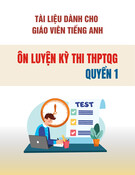
![Đề thi tiếng Anh tốt nghiệp THPT 2025 (Chính thức) kèm đáp án [mới nhất]](https://cdn.tailieu.vn/images/document/thumbnail/2025/20250627/laphong0906/135x160/9121751018473.jpg)


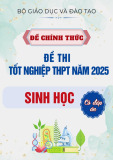
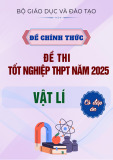
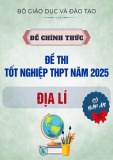

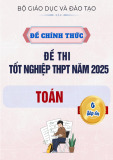

![11 chủ đề ôn tập môn Toán lớp 2 [chuẩn nhất]](https://cdn.tailieu.vn/images/document/thumbnail/2025/20250613/phuongnguyen2005/135x160/74791749803387.jpg)
